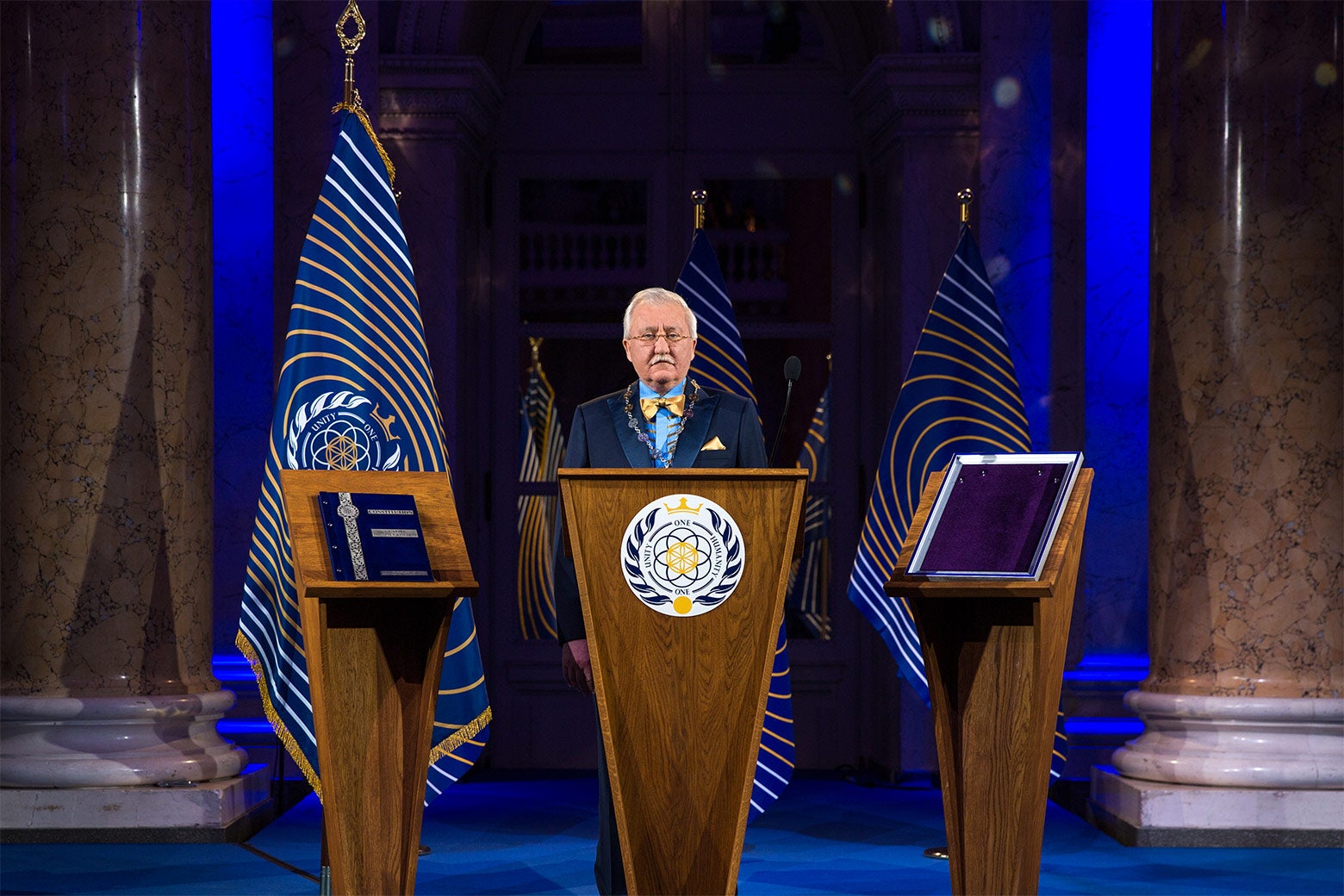It may be harder than ever to start a new nation on Earth, but what about in space? At a lavish ceremony Tuesday night in Vienna’s Hofburg Palace—the former residence of the Habsburg emperors—Russian businessman Igor Ashurbeyli was inaugurated as the first head of state of Asgardia, the proposed first nation-state in space. Since plans for Asgardia—named for one of the realms of the gods in Norse mythology— were first announced in 2016, more than 200,000 people have signed up to become citizens on the country’s website. Last year, it launched its first satellite—about the size of a loaf of bread, storing data on the country’s constitution and citizens—into orbit. A 150-member parliament with representatives from around the world met for the first time shortly before the inauguration.
For now, Asgardia is mostly the pet project of Ashurbeyli, an Azeri-Russian computer scientist and software CEO, who has also been footing most of the bills. But he has much bigger plans for the “nation.” I spoke with Ashurbeyli by phone, through an interpreter, the day after his inauguration in Vienna. The conversation has been edited for length and clarity.
Josh Keating: Why does humanity need a space nation?
Igor Ashurbeyli: For thousands of years, humanity has not been able to manage its own problems on Earth. Countries are divided by borders and fighting amongst themselves. So the time has come to solve the problem from space.
I’m still not clear on why we should apply Earth’s nation-state model in space. Does space really need countries?
We are not replicating the terrestrial model of development. On Earth, everyone is fighting for territory and resources. Instead we are offering the opportunity for infinite development. Space is infinite, therefore the opportunities for growth and research are also infinite. That requires all of humanity to unite. Therefore our national motto is “One Humanity, One Unity.” This kind of unity is not possible on Earth, because on Earth humanity is separated by artificial borders—by political borders, by religious borders. In Asgardia, all humanity is united.
Generally on Earth, a nation-state has to control territory in order to exist. Will that be the case for Asgardia? Will you control territory in space?
Our territory is the satellite Asgardia-1, which has already been launched. It will grow. Eventually, there will be a constellation of satellites in low-Earth orbit, then a constellation in high-Earth orbit. That will eventually culminate in settlements on the moon.
Do you believe there will be multiple human space nations eventually, or will Asgardia be the only one?
At the moment we are the only one. I cannot predict what will be in the future. We are striving to be 2 percent of the population of the world, which is 150 million people.
Is it correct that you’ve been mostly funding all of this yourself so far?
This is a correct statement for now. But by the end of this year, the government will be formed and the parliament will be formed, and they will be defining the financial policy of Asgardia. The budget will be approved by the parliament in September for the next year.
Are you seeking recognition from other national governments?
Yes. The first stage before applying to the United Nations will be bilateral agreements with other countries.
Are you in contact with any other national governments? Have you been able to form diplomatic relations?
Until the formal inauguration, I did not have a formal right to act as head of state. But of course, preliminary work was ongoing. We have approximately 16 informal connections which will be now followed up officially. We hope to have formal agreements within a period of six months. Ambassadors from 20 countries were present at the inauguration. The formal process will start once the ministry of foreign affairs is formed.
[Author’s note: A spokesperson for Asgardia told me the ceremony was attended by “representatives from U.N. missions based in Vienna and … representatives from West and Central Africa as well as the Gulf Cooperation Council.”]
President Trump recently said that he wants to create a Space Force of the U.S. military. As the president of a space nation, what is your response to that? And will Asgardia have a military?
According to the constitution of Asgardia, there is an air-space fleet, but the purpose of this fleet is the protection of the entire planet Earth from space. It will be not be engaging in conflict.
What concerns me about the statement of Mr. Trump is that space will become a new jungle.
Elon Musk has discussed setting up colonies on Mars with their own political systems. Do you anticipate Asgardia having relations with them?
SpaceX is a company. Asgardia is a state. There are a lot of companies that will be working with Asgardia, and we are happy to work with anyone working on the development of space exploration. Our task is to create infrastructure, to create opportunities for all of humankind so that they can fulfill themselves within the Asgardian state.
To a lot of people, this idea is going to seem pretty far-fetched. Why should we take this seriously?
We are not going to make an effort to convince people that we are serious. We have put forward and published all of our ideas. Those people who are able to understand them, they will join us. We are not doing PR.
Last question: The World Cup is happening right now. When can we expect to see an Asgardia football team competing?
It is our plan to apply for the International Olympic Committee at the beginning of next year. But because Asgardians are living all over planet Earth, we are likely to begin with competition in solo sports. It’s very difficult to train for team sports when you live in different countries. Most likely next year, we will hold an Asgardian chess championship.
